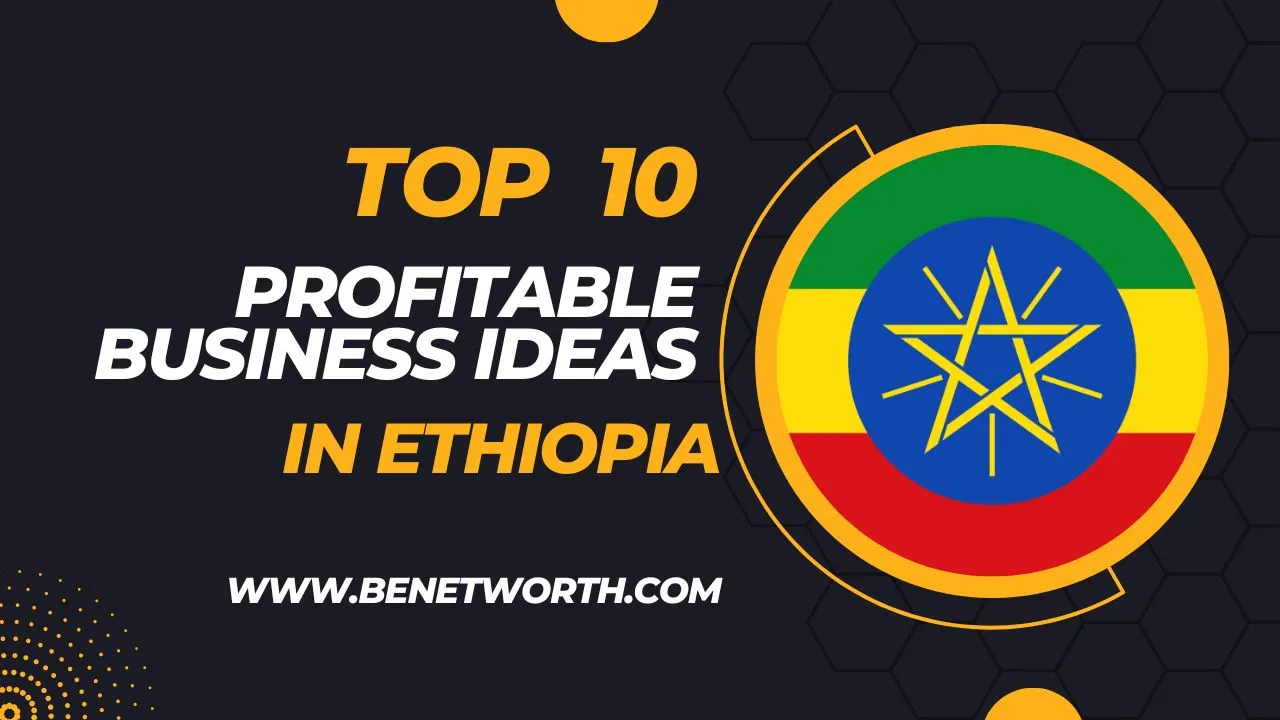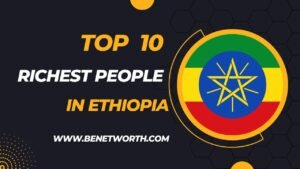Ethiopia is a rapidly growing economy in East Africa, with a population of over 112 million people. In recent years, the country has experienced significant growth in various sectors such as agriculture, manufacturing, and services. With the government’s focus on economic development and investments pouring into the country, Ethiopia presents ample opportunities for entrepreneurs to start profitable businesses.
In this article, we will explore the top 10 profitable business ideas in Ethiopia that are expected to be profitable in Ethiopia by 2023. These business ideas have been carefully researched and analyzed based on market trends and demand.
Whether you are an aspiring entrepreneur or an established business owner looking to expand your portfolio, these ideas offer great potential for success in Ethiopia’s thriving economy.
Overview of Ethiopia’s Economy and Business Climate
Ethiopia’s economy is one of the fastest-growing in Africa, with an annual growth rate of about 10%. The country’s main sectors include agriculture, manufacturing, and services. Agriculture employs around 80% of the population and contributes to about 40% of the country’s GDP. Coffee, sesame seeds, and flowers are some of Ethiopia’s top exports.
The Ethiopian government has been implementing policies to attract foreign investment and create a conducive business environment. There are several incentives for investors, including tax holidays, import duty exemptions on capital goods and repatriation of profits. The World Bank Ease of Doing Business Index ranks Ethiopia at 159th out of 190 countries.
However, there have been efforts to improve this ranking by digitizing procedures and reducing bureaucratic hurdles for businesses.
Some profitable business ideas in Ethiopia include agro-processing (such as food processing), renewable energy solutions (like solar power), tourism (due to its rich cultural heritage), ICT-related services (such as software development), and manufacturing industries such as textile production or leather goods manufacturing.
These sectors offer great potential for investment due to the growing middle-class population driving demand for these products/services.
Agriculture | Opportunities in Farming, Livestock, and Fisheries
Agriculture is the backbone of Ethiopia’s economy and provides immense opportunities in farming, livestock, and fisheries. With a favorable climate and vast arable land, Ethiopia has the potential to become a major agricultural powerhouse in Africa.
The country has diverse agroecological zones that support different types of crops including cereals, fruits, vegetables, coffee, tea, cotton, and oilseeds.
The livestock sector in Ethiopia is also a significant contributor to the economy with millions of people engaged in pastoralism and animal husbandry. The country has one of the largest livestock populations in Africa with about 60 million cattle alone.
The fisheries sector is another area that presents untapped opportunities for investment. Ethiopia’s lakes and rivers are home to various fish species that can be harvested sustainably.
Entrepreneurs looking for business ideas can tap into these opportunities by investing in crop production, livestock rearing, or fish farming. They can engage in value addition activities such as processing and packaging to increase their returns on investment.
Additionally, there are opportunities to export agricultural products to regional markets such as Sudan and Djibouti or even beyond Africa to Europe or Asia.
Read also: Top 10 Countries with Freshwater Resources 2023
Real Estate and Construction | Demand for Housing and Commercial Spaces in Urban Areas
The demand for housing and commercial spaces in urban areas in Ethiopia has been on the rise due to rapid urbanization. The country’s GDP growth rate has been consistently above 7% over the past decade, making it one of Africa’s fastest-growing economies. As a result, more people are moving into cities like Addis Ababa, which is experiencing a housing shortage.
Real estate developers and construction companies have an opportunity to meet this demand by building affordable housing units and commercial spaces such as malls, office buildings, and hotels. However, they face challenges such as obtaining permits from the government and accessing financing.
Despite these challenges, there is potential for high returns for investors who can successfully navigate the real estate market in Ethiopia. As the country continues to experience economic growth and urbanization, the demand for housing and commercial spaces is expected to remain strong.
Information and Communication Technology (ICT)
One of the most profitable business ideas in Ethiopia in 2023 is investing in Information and Communication Technology (ICT). With the rapid advancement of technology, there is a growing demand for ICT products and services in Ethiopia.
This presents an opportunity for entrepreneurs to invest in areas such as software development, mobile app development, web design, digital marketing, and e-commerce.
Furthermore, the Ethiopian government has made significant strides to develop the ICT sector through initiatives such as the National ICT Policy and Strategy. The government has also established institutions such as the Information Network Security Agency (INSA) to promote cybersecurity.
By investing in ICT businesses in Ethiopia, entrepreneurs can tap into this growing market while contributing to the country’s economic growth.
In conclusion, with a favorable business environment and an increasing demand for ICT products and services, investing in this sector presents a lucrative opportunity for entrepreneurs looking to start a profitable business venture in Ethiopia by 2023.
Tourism and Hospitality | Potential for Eco-Tourism and Cultural Experiences
Ethiopia is a country with a rich and diverse culture, making it an ideal destination for eco-tourism and cultural experiences. With its lush forests, majestic mountains, and unique wildlife, Ethiopia has the potential to become a top ecotourism destination in Africa.
The country already boasts several national parks and reserves that offer visitors the chance to experience amazing wildlife such as baboons, hyenas, lions, elephants, and leopards.
In addition to the natural beauty of Ethiopia’s landscapes, the country also has a rich history and cultural heritage. Visitors can explore ancient cities like Axum or Lalibela- home to some of the world’s most impressive rock-hewn churches- or take part in traditional Ethiopian festivals like Timkat or Meskel.
Cultural tourism offers visitors an opportunity to learn about local customs and traditions while engaging with communities across Ethiopia.
Overall, there is vast potential for developing eco-tourism and cultural experiences in Ethiopia’s hospitality industry over the next few years. Investing in these areas could not only boost profits but also help preserve Ethiopia’s natural resources while sharing its unique culture with travelers from around the world.
Tech: Growing Digital Sector and IT Services
As the world continues to embrace digitalization, Ethiopia’s tech industry is growing steadily. The country’s young and vibrant population presents an ample market for IT services ranging from software development to web design. With the government investing in infrastructure such as high-speed internet connectivity and supportive policies, the digital sector is poised for significant growth.
One profitable business idea in Ethiopia’s growing tech industry is software development. The demand for custom software solutions has been on the rise among businesses looking to streamline their operations or improve customer experience.
Another lucrative venture is website design and development, with many small and medium enterprises seeking online presence to reach a wider audience.
Furthermore, IT services such as cybersecurity consulting are also essential in safeguarding businesses against cyber threats that pose risks of data breaches and financial losses.
As more Ethiopian businesses embrace technology, entrepreneurs can tap into this growing market by offering innovative solutions that solve unique problems while adapting to changing trends.
Read also: Top 10 Richest Countries in South America 2023
Healthcare Services
Healthcare services in Ethiopia are becoming increasingly important, as the country continues to develop and grow. With a population of over 100 million people, there is a growing demand for quality healthcare services that are accessible and affordable.
Healthcare providers in Ethiopia are poised to benefit from this trend, especially those who can offer innovative solutions that cater to the needs of their patients.
The healthcare sector in Ethiopia offers various profitable business ideas for investors looking to capitalize on this growth opportunity. From private clinics and hospitals to pharmaceutical manufacturing and distribution, there is no shortage of opportunities available.
In addition, there is a growing need for health insurance companies that can provide affordable coverage for individuals and families who cannot afford expensive medical treatments.
As the Ethiopian government continues to invest in improving infrastructure and expanding access to healthcare services across the country, it is expected that demand for these services will only continue to rise.
Entrepreneurs who are willing to invest their time and resources into building sustainable healthcare businesses have an opportunity to make significant profits while also contributing positively towards improving public health outcomes in Ethiopia.
Education and Training
One of the most important aspects of starting any business venture is having a solid foundation in education and training. Whether it’s acquiring a formal education in business management or learning technical skills through vocational training, investing in education is crucial to ensuring long-term success.
In Ethiopia, there are numerous opportunities for entrepreneurs to gain the necessary knowledge and skills needed to launch their own businesses.
One popular option for aspiring entrepreneurs is to enroll in business courses at local universities or colleges. These programs offer a comprehensive curriculum that covers topics such as finance, accounting, marketing, and management. Additionally, vocational training centers provide skill-based courses that teach practical skills such as carpentry, welding, plumbing, and electrical work.
In addition to formal education programs, there are also many resources available online that can help entrepreneurs develop their skills and knowledge base. Websites such as Coursera and Udemy offer free or low-cost courses on a wide range of topics related to business management and entrepreneurship.
By taking advantage of these resources, aspiring entrepreneurs can gain the knowledge they need to succeed in today’s competitive market.
E-commerce
One of the most profitable business ideas in Ethiopia for 2023 is e-commerce. With a population of over 100 million people and an increasing number of Internet users, there is great potential for online businesses. E-commerce offers a convenient way for customers to purchase goods and services without leaving their homes, making it an attractive option.
Starting an e-commerce business requires minimal investment compared to brick-and-mortar stores, as there’s no need to pay rent or hire additional staff. However, it does require careful planning and execution to succeed.
Business owners must create user-friendly websites with easy-to-navigate interfaces that allow customers to browse products, place orders, and make payments seamlessly.
To maximize profit in the competitive world of e-commerce, entrepreneurs must also ensure the timely delivery of products and provide excellent customer service. By establishing trust with customers through transparency and reliability, e-commerce businesses can build a loyal customer base that will help them thrive during tough economic times.
Renewable Energy
Renewable energy is one of the most promising and profitable business ideas in Ethiopia. With a growing population and expanding economy, there is an increasing demand for reliable and sustainable energy sources.
Ethiopia has abundant renewable resources such as hydroelectric power, wind power, solar power, and geothermal energy. These resources have the potential to provide clean electricity to meet the country’s energy needs.
Investing in renewable energy businesses can be highly profitable due to the incentives provided by the Ethiopian government. The government offers tax exemptions on imported equipment used for renewable energy production and provides subsidies for investors who want to set up renewable projects.
Furthermore, with Ethiopia’s high levels of sun exposure throughout the year, solar panels make an excellent investment option as they have low maintenance costs once installed.
Overall, investing in renewable energy businesses in Ethiopia could prove to be a wise choice given the country’s commitment to sustainable development goals and its rich natural resources. Therefore, it is essential that entrepreneurs take advantage of this emerging market before it becomes too competitive or saturated with established players in the industry.
Manufacturing: Focus on Textile, Leather, and Food Processing Industries
 The textile industry is one of the most significant industries in Ethiopia, accounting for 10% of the country’s GDP. The country has considerable potential for growth due to its abundant supply of cotton. Currently, Ethiopian textiles are exported primarily to European and American markets.
The textile industry is one of the most significant industries in Ethiopia, accounting for 10% of the country’s GDP. The country has considerable potential for growth due to its abundant supply of cotton. Currently, Ethiopian textiles are exported primarily to European and American markets.
However, there is a growing demand for eco-friendly and sustainable clothing that presents an opportunity for Ethiopian businesses.
Leather processing is another profitable business idea in Ethiopia with an existing market base both domestically and internationally. The country is home to high-quality leather, making it attractive to foreign investors looking to source raw materials at competitive prices.
With the right capital investment and innovative marketing strategies, Ethiopian leather manufacturers can increase their presence in the global market.
Food processing also offers substantial opportunities for entrepreneurs in Ethiopia due to its natural resources such as coffee beans, fruits, vegetables, and livestock products like meat and dairy. The sector provides employment opportunities while also contributing significantly to export earnings.
Entrepreneurs can leverage these resources by investing in food manufacturing plants that produce value-added products such as instant coffee or dried fruits for exportation purposes. Overall, there are a plethora of opportunities within these three sectors that entrepreneurs can tap into with careful planning and execution strategies.
Retail and Wholesale Industry
 The retail and wholesale industry in Ethiopia is a lucrative business opportunity for entrepreneurs looking to invest in the country. With a growing population and increasing urbanization, there is a high demand for consumer goods such as food, clothing, electronics, and household items. The industry also benefits from Ethiopia’s strategic location as a transit hub for goods coming from Asia and Europe.
The retail and wholesale industry in Ethiopia is a lucrative business opportunity for entrepreneurs looking to invest in the country. With a growing population and increasing urbanization, there is a high demand for consumer goods such as food, clothing, electronics, and household items. The industry also benefits from Ethiopia’s strategic location as a transit hub for goods coming from Asia and Europe.
One of the most profitable business ideas in the retail and wholesale industry is starting a supermarket chain. This involves opening multiple stores across different locations to cater to the needs of customers in various regions.
Another business idea is establishing an e-commerce platform that offers online shopping services, which has become increasingly popular among Ethiopian consumers due to its convenience.
To succeed in the retail and wholesale industry in Ethiopia, entrepreneurs must prioritize their supply chain management by sourcing quality products at competitive prices while maintaining good relationships with suppliers.
They should also focus on customer service by providing excellent shopping experiences that keep customers coming back. By implementing effective marketing strategies and staying up-to-date with emerging trends, entrepreneurs can tap into the vast potential of this thriving industrial sector.
Conclusion: Summary of Top Business Opportunities in Ethiopia
In conclusion, Ethiopia offers a wealth of business opportunities for both locals and foreigners. Agriculture remains the backbone of the country’s economy, with coffee, fruits, and vegetables being some of the top exports. There is also a growing demand for renewable energy sources such as solar energy.
The tourism sector is experiencing exponential growth with visitors drawn to historical sites such as Lalibela and Axum, as well as wildlife parks like the Simien Mountains National Park. Education remains an untapped market in need of investment in areas such as private schools and vocational training centers.
Other profitable ventures include real estate development, manufacturing, healthcare services, and e-commerce platforms catering to Ethiopia’s burgeoning middle class. Overall, investors looking for high returns on their investments should consider exploring these top business opportunities in Ethiopia.
FAQ | Top 10 Profitable Business Ideas in Ethiopia 2023
Who is the richest man in Ethiopian?
According to Forbes, Mohammed Al Amoudi is the richest man in Ethiopia. He has an estimated net worth of $10.3 billion as of 2019, making him the wealthiest person in Ethiopia and one of the wealthiest people in Africa.
Al Amoudi made his fortune primarily through investments in energy and real estate. He is the owner of MIDROC Technology Group, a conglomerate with interests in construction, agriculture, mining, manufacturing, hotels and hospitality. He also holds a large stake in Saudi oil company Aramco and owns oil refineries in Morocco and Sweden.
Al Amoudi was born to an Ethiopian mother and a Saudi father in Ethiopia's capital city of Addis Ababa. His family moved to Saudi Arabia when he was just four years old but he returned to Ethiopia as an adult to pursue business opportunities there. He has since become one of the country's most influential figures and is highly respected for his philanthropic contributions to Ethiopian society.
Which region is richest in Ethiopia?
The region of Ethiopia that is considered to be the richest is the Amhara Region. This region has a long history of wealth and power in Ethiopia, and its economy is based largely on agriculture. The Amhara Region accounts for about a third of Ethiopia's gross domestic product (GDP) and it is home to many of the country's largest businesses. The region also has a large number of educated professionals, which contributes to its economic success.
The Tigray Region is also considered to be one of the wealthiest regions in Ethiopia. It has a strong agricultural sector and an expanding manufacturing industry. It is home to some of Ethiopia's most important cities, such as Mekelle and Adigrat, which are hubs for trade and commerce in the country. Additionally, the Tigray Region has significant deposits of gold, oil, natural gas, and other minerals that contribute to its wealth.
Who is the 20 richest people?
According to Forbes' 2019 Billionaires List, the 20 richest people in the world are:
1. Jeff Bezos – $131 billion net worth (Amazon)
2. Bernard Arnault & family – $76 billion (LVMH)
3. Bill Gates – $98 billion (Microsoft)
4. Warren Buffett – $82.5 billion (Berkshire Hathaway)
5. Amancio Ortega – $62.7 billion (Inditex)
6. Mark Zuckerberg – $62.3 billion (Facebook)
7. Carlos Slim Helu & family – $60.8 billion (Grupo Carso)
8. Larry Ellison – $58.5 billion (Oracle Corporation)
9. Larry Page – $50.8 billion (Google/Alphabet Inc.)
10. Charles Koch –$50.5 billion (Koch Industries, Inc.
Who is richest man in Oromia?
The richest man in Oromia is likely Mohammed Al Amoudi. He is an Ethiopian-Saudi billionaire businessman who was born in Ethiopia and has since become the wealthiest man in the country. He has a net worth of $12.3 billion, according to Forbes.
Al Amoudi made his fortune through investments in oil refineries and other businesses across Europe, Africa, and the Middle East. He is also a major stakeholder in many companies throughout Oromia, including National Oil Ethiopia, Midroc Ethiopia Technology Group, and the Addis Ababa Hilton Hotel. His investments have helped to create jobs and stimulate economic growth in the region.
In addition to his business ventures, Al Amoudi is well known for his philanthropic work throughout Oromia and Ethiopia more broadly. He has donated millions of dollars to various causes such as education, healthcare, poverty alleviation, and infrastructure development.
How rich is Ethiopia country?
Ethiopia is a lower-middle income country according to the World Bank. Its Gross Domestic Product (GDP) per capita was estimated at $1,127 in 2018. Ethiopia's economy has experienced rapid growth in recent years, with its GDP growing by an average of 10.9% between 2004 and 2018. This growth has been driven largely by the country's agricultural sector, which accounts for around 45% of its total GDP and employs roughly 85% of its population.
However, despite this strong economic performance, Ethiopia remains one of the poorest countries in the world, with more than 30% of its population living below the poverty line. It also faces significant challenges such as food insecurity, poor infrastructure and weak governance structures.
Does Ethiopia have any billionaires?
Yes, Ethiopia has billionaires. According to Forbes, there are currently two Ethiopian billionaires. The first is Mohammed Al Amoudi, who is a Saudi-Ethiopian businessman and investor with a net worth of $10.9 billion. He owns oil refineries in Sweden and Morocco as well as gold mines in Ethiopia and Eritrea. The second is Sheikh Mohammed Hussein Ali Al Amoudi, who is also a Saudi-Ethiopian businessman and investor with a net worth of $6.8 billion. He owns gold mines in Ethiopia and Sudan as well as real estate investments in Ethiopia, Djibouti, and Saudi Arabia.
Both of these billionaires have made significant contributions to the Ethiopian economy by investing in local businesses and creating jobs for Ethiopians. They have also donated millions of dollars to charities that support education, health care, and economic development projects in the country.
Who is the most successful entrepreneur in Ethiopia?
The most successful entrepreneur in Ethiopia is Sirak Asfaw. He is the founder and CEO of Africa’s first online payment system, EZPay. Sirak has achieved success in a variety of fields including technology, finance, and business. He was also named one of Forbes Africa’s 30 Under 30 for his entrepreneurial achievements.
Sirak is passionate about creating innovative solutions to address the challenges facing Ethiopia’s economy. He founded EZPay to make it easier for Ethiopians to send money across borders and to access banking services without having to leave their homes. His company has created more than 2,000 jobs in Ethiopia and has helped thousands of people access financial services with ease.
Sirak believes that entrepreneurship can be a powerful tool for economic development in Ethiopia and he hopes to inspire young entrepreneurs to take on the challenge of creating innovative solutions that will benefit their communities.
Who is richest man in Uganda?
According to Forbes, the richest man in Uganda is Patrick Bitature. He is a Ugandan businessman and entrepreneur with an estimated net worth of $550 million.
Bitature was born in Uganda and started his career as a banker before founding Simba Group, which is one of the largest conglomerates in East Africa. His company operates in multiple industries including telecommunications, real estate, hospitality, and banking. He also owns several radio stations and television channels throughout Uganda.
Bitature has been recognized for his philanthropic efforts in the country, including providing scholarships to students from low-income backgrounds and establishing a foundation that provides healthcare services to rural communities. He has also invested heavily in infrastructure projects such as roads and bridges which have helped to improve transportation throughout Uganda.
Who are the 4 richest men in Kenya?
According to Forbes, the four richest men in Kenya are Manu Chandaria, Naushad Merali, Chris Kirubi and Narendra Raval. Manu Chandaria is the wealthiest of these four with a net worth of $2.3 billion. He is the founder and chairman of Comcraft Group, a conglomerate with interests in steel, plastics and chemicals manufacturing. Naushad Merali is the second richest man in Kenya with a net worth of $1.6 billion. He is the founder and chairman of Sameer Group, which operates in industries such as agriculture, automotive, finance and real estate.
Chris Kirubi is the third richest person in Kenya with a net worth of $1 billion. He has investments in industries such as media broadcasting, retailing and manufacturing. Finally, Narendra Raval rounds out the list with a net worth of $800 million.
Who is the Gambian richest men?
The Gambian richest man is believed to be Sheikh Sidia Bayo. He is a businessman and philanthropist who has made his fortune through investments in real estate, telecommunications, and other industries. He is also the founder of the Bay Group, a conglomerate with operations in several African countries.
Bayo has been active in philanthropic activities, including donating money to support education and health care programs for Gambians. He also supports youth initiatives such as the Gambian Youth Leadership Program, which helps young people develop leadership skills and start their own businesses.
Bayo's wealth has been estimated at around $1 billion, making him one of the wealthiest people in Africa. He is also one of the most influential figures in Gambian business and politics, having served as an advisor to former President Yahya Jammeh.
Who is Oromo hero?
Oromo hero is a term used to refer to a wide range of individuals who have made significant contributions to the Oromo people and their culture. The most prominent Oromo heroes include Haile Selassie, the former Emperor of Ethiopia; Jawar Mohammed, an influential Oromo activist and political leader; Mamo Mezemir, an important religious figure in the history of the Oromo people; and Abba Gadaa, a renowned military leader who defended the rights of the Oromo people during their struggle for freedom.
Each of these figures has played an important role in shaping the history and culture of the Oromo people, and they remain revered figures among many members of this community.






















+ There are no comments
Add yours